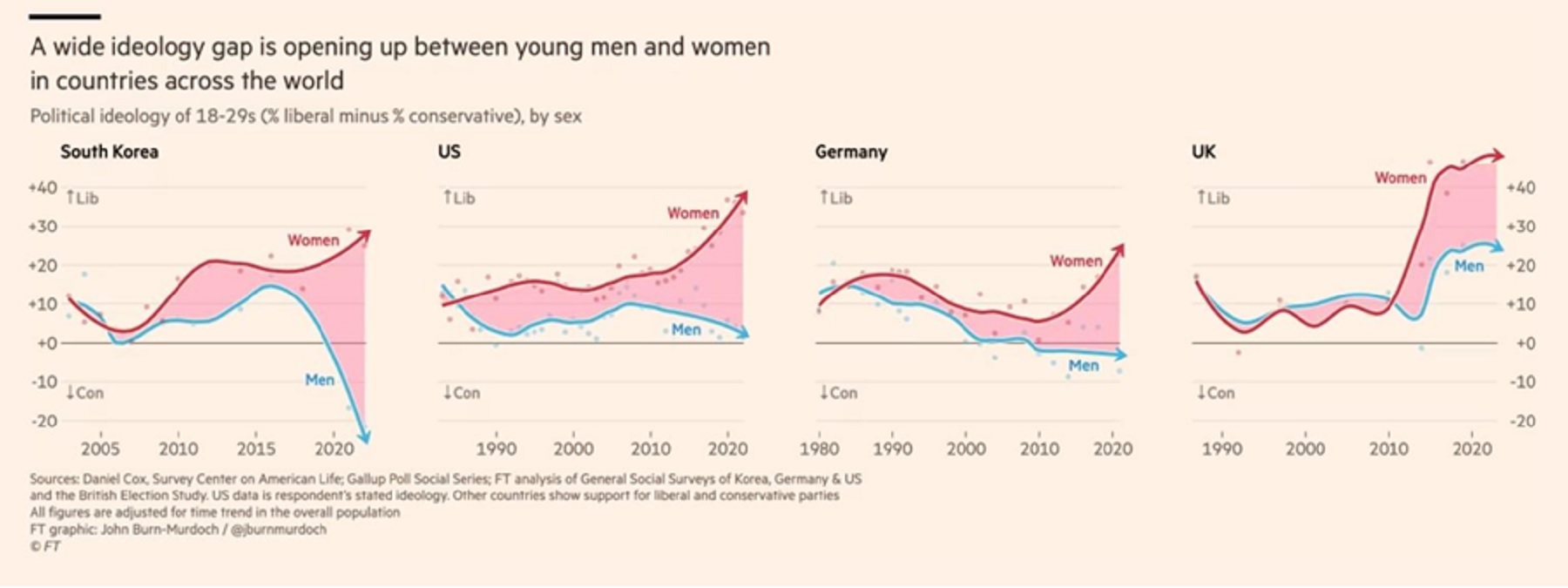The far right: A reactionary backlash

First published in Spanish at Revista Contexto. Translation from Transform Network.
I’ve been reading analyses of the far right for years, without finding one that really offered the key to understanding why these forces have so much support. That was until the last few months, when I read a study in the Financial Times, an old feminist book, and a journal article by two historians. Together, they prompted me to think about the answer that — in a nutshell — I intend to set out here.
The rise of the far right is not an expression of political discontent, nor a social pathology, nor still less an expression of anti-systemic feeling. The growth of the far right in the last decade is a backlash — and, moreover, a global backlash. But a backlash against what? Against a shifting of the terrain.
History has changed
Some academic historians have argued that the most profound change resulting from the acceleration of globalisation is the transformation of the concept of History itself — and that this has much to do with the rise of the far right. I am greatly impressed by their argument.
They explain that world history has tended to be studied and taught as a linear history, a series of stages (which even have names and start- and end-dates) through which humanity moves forward, towards ‘progress’. Because of the European empires, History has been understood as Western history, a tree in whose top branches are the developed nations (the great powers, the empires) led by elite white men who are the masters of technology and of the vision of progress (‘civilisation’, it used to be said), whereas lower down are the nations on the path set out by that model of development, and all the other subaltern groups.
These new historians — whose thinking is described in the article by Hugo and Daniela Fazio which I am suggesting to readers — point out that this concept of history is now unsustainable. The rise of Asia, especially China, is deconstructing this idea of Western history. But it is also deconstructed by the emergence of feminism and anti-racism, with its decolonial message, which have brought a shift away from this vision of History in favour of a much more global and diverse one. They have baptised History as a global history, and done so on the basis of a precious truth, which will be self-evident for those without gender or class blindness: Today, subaltern groups that have been under-represented or made invisible in contemporary history are bursting onto the scene, making new demands with new leaderships and epistemologies, as the myth of the West is dislocated in favour of a much more diverse world.
This displacement generates resentment among those who think that they are losing their privileged position, in a world that no longer sees them as an authority and thus challenges their position of power. The far right is just that: backlash by those who are losing their privileges, or fear losing them. The feeling that it manipulates is resentment: Not anger, not rage, not political disenchantment, but a resentful victimisation, the appeal to the wounded narcissism of those who feel they have lost their leading role in history, at home, or in the workplace. The rise of militarism and war are part of this violent reaction against a world that is shifting the terrain underneath them, and against the wave that is dislodging them from their position.
The fourth wave
One feminist book that had a huge impact in the 1990s was Backlash: The Undeclared War Against American Women. Its author Susan Faludi denounced the conservative backlash against women’s advancement in those years — insightfully pointing out that this backlash was not because women had achieved full equality, but because ‘it was possible for them to achieve it’. Faludi’s book helped me to understand that the rise of the far right is a reaction, first and foremost (though not only, against the fourth wave of feminism. I assure you: the data is irrefutable.
This 25 January, the Financial Times published a study that made the heads of many analysts of the far right explode. The article showed the youth vote by gender in South Korea, the US, Germany and the United Kingdom. It concluded that there is a yawning gap between the political attitudes of young women (who are far more progressive) and young men (who are more conservative and more likely to support the far right). The most shocking thing is that this is a global phenomenon, happening all over the world — including in Spain:

The strangest attempts are made to rationalise all this, often leaving me amazed. They range from claims that women are more ‘moderate’ to the idea that we have ‘less contact with migration’, and other such nonsense. It is obvious, without the gender blindness that pervades academia, that this is the consequence of the fourth wave that has swept the world. When it emerged, almost a decade ago, it did so globally, as a mass movement, expressed through social networks and with a strong intergenerational component.
This is, moreover, a feminist wave that has been more anti-capitalist than previous ones; a feminism that disarms the historical role of patriarchy and has won the battle for the aspiration of equality. The far right is a violent reaction to this displacement, to this dethroning of the pater familias, the dominant male, the maker of history.
Here I think it worth observing that many analyses reduce machismo and racism to moral, cultural attitudes — refusing to reckon with the fact that both constructs are used in capitalism to exploit us further. The self-evident fact that women and migrants are cheaper, indeed all over the planet, doesn’t seem to make a dent in their analysis. They have to go to great lengths to deny the data and continue to insist that women and migrants are minorities and treat us as such, even when the reality is quite the opposite. I almost admire their stubbornness.
I may be wrong, but I sense, moreover, that the analytical blindness is not only gender-based. I detect a stubborn reluctance to accept that there is no direct relationship between economic inequality and the growth of the far right; in other words, economic orthodoxy does not serve to analyse the phenomenon. If this were the case, there would be no way of explaining its success in Scandinavian countries (the least unequal in the world) or the fact that in the country where inequality is most glaring, South Africa, the far right does not even exist. Of course, the economic situation may be a trigger for the growth of the far right, but it is not its cause.
It seems that cold economistic metrics don’t grasp resentment — and resentment is the sentiment that drives backlash. To understand this better, I suggest reading the superb study by Tereza Capela et al. on Korean far-right youth, which concludes, decisively, that their attitudes are exclusively built on resentment and victimisation.
Reactionary whispers
I smell, with trained senses, a certain tendency (from which not even the European left is free) to appease some of the claims of the far right, in the face of the threat that they pose. This is itself a global phenomenon. I am beginning to hear, subtle as a whisper, that perhaps we feminists have gone too far, that we ought to pay more attention to the demands of these young men who are turning to the right, that immigration is a problem, that what’s happening in Palestine is not genocide, that we need to buy more weapons, that the climate crisis is not so fundamental…
I would argue the opposite. The antithesis to the far right — its nemesis — is precisely the defence of feminism, especially of young women and their demands, the concept of class versus nation, the defence of peace, diversity, equality, social justice, solidarity, ecology, and a common world. We must defend them, moreover, with an outlook that overcomes the narrow and hierarchical worldview of the West.
I would argue that the far right is a backlash against the energies with which we subalterns are starting to change the world. But I would also warn — to echo Susan Faludi — that this is backlash not only against change that has taken place already, but also against the possibility of future change. They are reacting violently to change, in order to prevent it from occurring. And that is what the far right is: pure reaction.
Marga Ferré is co-president of Transform Europe.